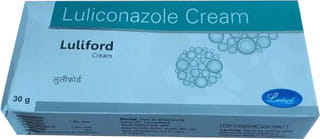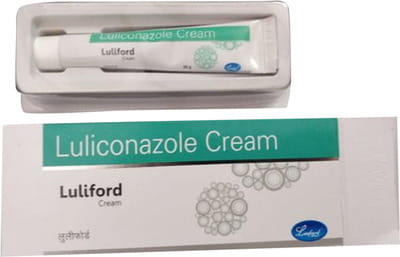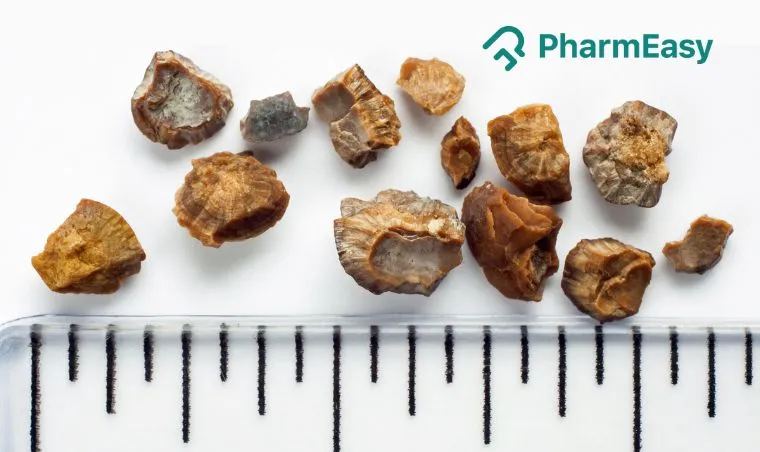Luliford 1% Tube Of 30gm Cream
Description
Luliford Cream is an antifungal medication used to treat common fungal skin infections, including athlete’s foot, ringworm, and jock itch. It contains luliconazole as its active ingredient, which works by inhibiting the growth of fungi and relieving symptoms such as itching, redness, and irritation. This cream is meant for external use only and should not be applied to areas other than those prescribed by your doctor.
When using Luliford Cream, apply a thin layer to the affected skin area after thoroughly cleaning and drying it. Always wash your hands before and after applying the cream to prevent the spread of infection. Do not cover the treated area with bandages or dressings unless directed by your doctor. Using this medicine regularly at the same time each day will give you the best results.
You should not use Luliford Cream without medical advice for skin problems that are not caused by fungal infections. It is essential to complete the full course of treatment, even if your symptoms improve, to prevent the infection from recurring. If you do not notice any improvement within two weeks of use, consult your doctor for further guidance.
Before starting treatment, tell your doctor if you have any skin allergies, chronic conditions, or ongoing skin irritation. Pregnant or breastfeeding women should consult their doctor before using Luliford Cream to ensure it is safe. Avoid contact with the eyes, nose, or mouth. If accidental contact occurs, rinse the affected area thoroughly with water.
Luliford Cream is a safe and effective antifungal treatment when used as prescribed. To support recovery, maintain good hygiene, keep the affected area dry, and wear loose, breathable clothing. Always follow your doctor’s advice and never share your medication with others, even if they have similar symptoms.
Product Summary
| Offer Price | ₹126.00 |
| You Save | ₹99.00 (44% on MRP) |
| Contains | Luliconazole(1.0 %W/W) |
| Uses | Skin fungal infection |
| Side effects | Skin irritation, itching, burning sensation |
| Therapy | TOPICAL ANTI-FUNGAL |
Uses
- Luliford Cream is used in the treatment of fungal infections of the skin in adults. It is effective in fungal skin infections caused by fungi Tinea.
Contraindications
- If you are allergic to terbinafine or any of the ingredient of Luliford Cream.
- If you are a breastfeeding woman.
- If you are suffering from liver disease.
Side effects
- Skin irritation
- secondary skin infection
- Itching
- burning sensation
- Local skin reactions at the site of application
Precautions and Warnings
Pregnancy
Breast Feeding
Driving
Alcohol
Other General Warnings
- You experience any local allergies after using this medicine.
- You should not use this Cream for any other ailment except for the one prescribed by your doctor.
- You should not give it to other people, even if they have the same symptoms that you have.
- This Cream should not be applied to the eyes or vagina.
- In case your eyes come in contact with this Cream, then wash your eyes with water immediately and if there are any symptoms, then consult your doctor.
- This medicine should not be used for children under 12 years of age.
Directions for Use
- Luliford Cream has to be used for external application only as prescribed by your doctor.
- Wash your hands properly after you apply Luliford Cream unless your hands are the area to be treated.
- Avoid touching the tip of the container to the infected area as it may contaminate the Cream.
- It should be applied to the affected area as a thin film and on 1 inch of skin around the affected area.
- It is not meant for use near the mouth, eye or vagina.
Storage and disposal
- Store Luliford Cream at room temperature between 20°C to 25°C.
- Keep this Cream out of the reach of children and pets.
- Once opened should be used within one month.
- Discard any unused medicine properly, and do not throw it in trash or wastewater.
Dosage
Overdose
Missed a Dose
Mode of Action
How Does It Work?
Interactions
Interactions with other medicines
- Since this medicine is to be used externally on the skin, it is less likely to interact with other medicines.
- Luliford Cream used in a larger amount for a prolonged period may interact with the action of omeprazole (used in acidity).
- You should consult your doctor if you are on any other medicines along with Luliford Cream Cream.
Content Details
Dr. Ravi Kakarla
MBBS, MBA
Dr. Ritu Budania
MBBS, MD (Pharmacology)
Frequently Asked Questions (FAQs)
Q: Can we use Luliford Cream in children?
Q: Is Luliford Cream suitable for skin allergy?
Q: Can Luliford Cream be useful for skin burns?
Q: When to stop Luliford Cream use?
Q: Can I Use Luliford Cream for Athlete's foot?
Q: What are the main causes of the Athlete's foot?
References
- LUZU (luliconazole) Cream, 1% for topical use [Internet]. Accessdata.fda.gov. 2025 [cited 30 March 2025]
- CDSCO [Internet]. Cdscoonline.gov.in. 2025 [cited 30 March 2025]
- ScienceDirect. Luliconazole. ScienceDirect. 2024 [cited 7 Mar 2025].
- Drugs.com. Luliconazole: Indications, Side Effects, Warnings [Internet]. 2024 [cited 7 Mar 2025].
- MedlinePlus. Luliconazole Topical [Internet]. National Library of Medicine; 2024 [cited 7 Mar 2025].
- Dailymed - LULICONAZOLE cream [Internet]. Dailymed.nlm.nih.gov. 2021 [cited 7 Mar 2025].
Did you find this medicine information helpful?
Please rate your experience
Other Products from this Brand
Blog Articles
Chronic Condition Articles
Top-Tests we cover:
Top-Selling Healthcare Products:
Top-Selling Medicines:
Top-Searched Medicines:
Top Searched Vaccines:





















